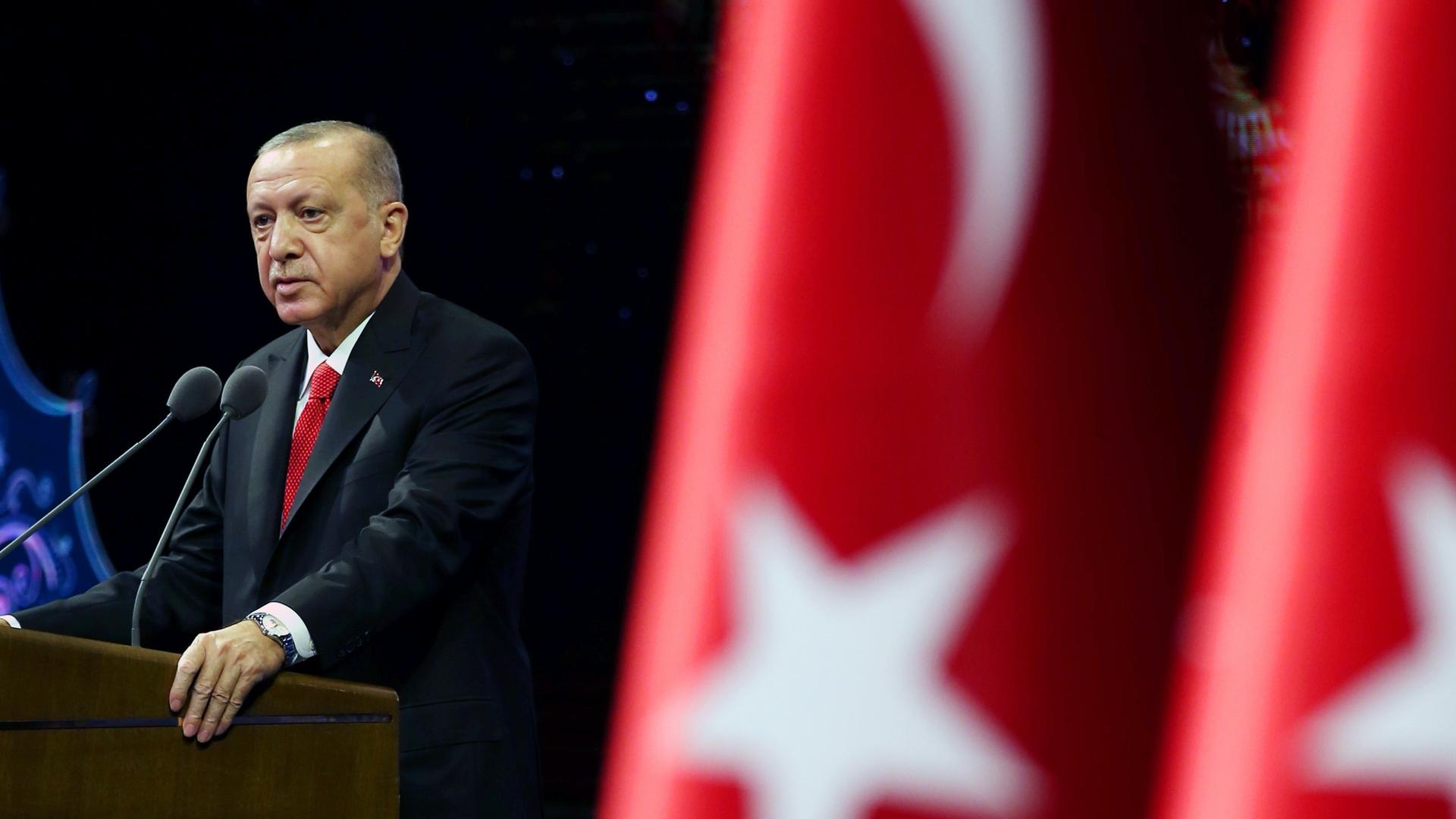As France mourns a beloved teacher murdered after showing controversial cartoons in class, a diplomatic rift between Europe and the Muslim world over secularism and religious freedom is widening.
Railing against Islamophobia in the West, Turkish President Recep Tayyip Erdoğan joined a regional call for a boycott of French imports on Monday. He was cheered on by a Turkish national newspaper, which published lists of French brands to avoid at the market.
Before his gruesome murder on Oct. 16, Samuel Paty, 47, a history teacher in a suburb of Paris, had shown cartoons depicting the Prophet Muhammad in a class about freedom of speech. In response to the fatal attack, French authorities swiftly launched investigations into Muslim groups and called for the dissolution of a pro-Palestinian group in France that officials claim is fomenting violence.
Over the weekend, Erdoğan blamed French President Emmanuel Macron for attacks against Muslims in France, and quipped Saturday that Macron didn’t understand religious freedom and needed “mental health treatment.” France recalled its ambassador to Turkey the next day.
“I am calling on my nation. Don’t compliment French brands, don’t buy them.
“I am calling on my nation. Don’t compliment French brands, don’t buy them,” Erdoğan said to a crowd gathering for a religious celebration at a civic center in Ankara. He added that Muslims are “subjected to a lynching campaign similar to that against Jews in Europe before World War II.”
Related: Turkey passes ‘draconian’ social media legislation
According to parents of students in Paty’s class who spoke to Agence France-Presse, Muslim students were told they could leave the room while the cartoons were shown. But an 18-year-old man of Chechen descent, who allegedly heard about the incident from disgruntled parents online, followed Paty home after school and beheaded him. The suspect was later shot and killed by police.
The cartoons were originally published by the satirical French magazine Charlie Hebdo, which was later the target of a 2015 massacre that killed 12 people. During a national period of mourning for Paty, the Charlie Hebdo cartoons were projected onto public buildings.
It is this aftermath that has drawn the ire of Ankara.
“The boycott calls are pointless and must stop immediately, as well as all the attacks directed against our country, instrumentalized by a radical minority.”
In a statement, the French Foreign Ministry said its critics are distorting France’s values of freedom of expression and religion and its rejection of all forms of hatred. “The boycott calls are pointless and must stop immediately, as well as all the attacks directed against our country, instrumentalized by a radical minority,” it read.
Related: Expulsions, pushbacks and extraditions: Turkey’s war on dissent
France’s hardline approach to secularism often goes beyond what US policymakers would consider a legal separation of church and state. It is often at odds with the beliefs of the country’s growing Muslim population. The wearing of religious symbols, such as a headscarf, is banned in French schools and for public employees. Turkey, whose secular founders were inspired by the French system in the 1920s, overturned its headscarf ban in 2008.
Speaking at a memorial for Paty, President Macron said the 47-year-old teacher had become “the face of the Republic.”
“We will defend the freedom that you taught so well, and we will uphold secularism,” Macron said. “We will not renounce caricatures, drawings, even if others move backward… We will continue, teacher.”
In The World’s limited survey of grocery stores in the Istanbul neighborhood of Kasimpaşa, as of Monday night French products remained on the shelves. Many Turkish social media users appeared more concerned about the continued devaluation of the Turkish lira, which reached a new low of 8.09 TL against the US dollar. But protests against France were scheduled for Tuesday in several Turkish districts.
“I think that [Erdoğan’s] harsh reaction is instrumentalizing Islam to score political gains.”
“I think that [Erdoğan’s] harsh reaction is instrumentalizing Islam to score political gains,” said Sinem Adar, an analyst of domestic Turkish politics at the Center for Applied Turkey Studies at the German Institute for International and Security Affairs.
Adar points to pro-government Turkish newspapers, which offered little coverage of Paty’s murder but copious reporting on French condemnations of Islamic violence. Eventually, Adar says, some columnists suggested that the crime itself was staged by the French government as a pretext for going after Muslims.
“The ways in which the Turkish government has been engaging with and interacting with the Turkish diaspora, trying to mobilize them and instrumentalize them. At the end of the day, I think it really harms the people living here,” Adar said.
Related: Turkey’s president formally makes Haghia Sophia a mosque
Islamophobia continues to rise in France and other parts of the West. Hate crimes are increasing, especially against women who wear headscarves and other types of coverings to mark their faith. But polarizing rhetoric like Erdoğan’s, Adar says, can backfire on Muslims living in Europe.
Europeans see Erdoğan’s rhetoric as alarming, she says, forcing Muslims in Europe to choose between supporting an increasingly conservative view of Islam espoused by the region’s leaders, or assimilate into European-style secularism.
“You’re either a supporter of Erdoğan, or you’re not,” she said.
